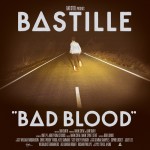It’s been a couple of years since pop group Bastille’s first tracks from EPs and mixtapes caused a buzz, but the British quartet, led by frontman Dan Smith, is finally ready to storm the American music scene with its full-length debut album, “Bad Blood.”
While the album’s release falls late into the summer and, for some, clashes with the back-to-school blues, the timing could not be more perfect. “Bad Blood,” with its dramatic instrumentation and references to Greek mythology and the Bible, comes off as nothing less than an earth-shaking battle cry.
From the start, Smith pulls out all the stops. The powerful first track, a pop-rock anthem titled “Pompeii,” may be most well known in the United States for being a summertime radio staple popular for its majestic chorus and Smith’s lilting, accent-tinged voice. But while “Pompeii” sets up an optimistic mood that diffuses through the whole album, its lyrics are in fact subtly tragic in their discussion of crumbling lives beneath a toppling city: “Oh where do we begin? / The rubble or our sins?”
The album contains several memorable songs: “Overjoyed,” a semi-R&B ballad supported by piano chords played in a minor key, and “Daniel In The Den,” a quasi-Biblical allusion supported by a magnificent instrumental arrangement, showcase Bastille’s prowess with balancing background music and vocals. Through its fusion of electronic and traditional styles, the group skillfully uses its knowledge of sound and space to create complex layers of tones that work beautifully for each song, whether it be in the peppy chorus of “Things We Lost In The Fire” or in the upbeat, organ-backed title track “Bad Blood.”
“Oblivion,” a haunting, piano-based number that puts Smith’s vocal talent in the spotlight, may perhaps be the best song on the album, not because of its power, but because of its lack thereof. Soft and deeply emotional, “Oblivion” gives the listener a break from the many fast-paced songs and matches the lyrics to the elegant tune: “Are you going to age with grace? / Are you going to leave a path to trace?”
A remarkable quality of Bastille’s is its ability to stay familiar yet, at the same time, completely unexpected. The lyrics and the underlying beats stay close to home even to newly inducted fans of pop, but the fresh little details — the deep synthesized bass lurking beneath the piano chords in “Overjoyed,” the electro-a cappella overlay in “Get Home” — add a pleasant element of surprise.
At times, however, the album presents a recurring flaw: The lyricism becomes bland and unimaginative. In “Laura Palmer,” a tribute to a 1990s television series titled “Twin Peaks,” Smith sings, “This is your heart / Can you feel it? / … Pumps through your veins” and tries too hard to pass biology as a legitimate emotion.
Nevertheless, the background instrumentation more than makes up for the lyrical banality. The album’s charm lies in its stubbornness to stay upbeat, no matter the lyrical content. Almost all of the tracks have massive hooks and grand, sweeping choruses that become, in a way, celebratory anthems of life. Smith proves his versatility as one of the great vocalists of the pop world with his ability to shift styles effortlessly from alternative rock to R&B. Yet his voice, while technically impeccable, still contains enough minor imperfections to sound human and comforting.
After about 40 minutes, “Bad Blood” ends with “Get Home,” an electronic fantasy that leaves behind, at its close, a strange feeling that this is what pop music should sound like. A beautiful blend of instrumentation, both traditional and synthesized, ties the album together in two succinctly wistful lines: “To the morning we’re cast out / But I know I’ll land here again.”
All in all, Bastille has managed a remarkable accomplishment with “Bad Blood.” In a world of weary tunes that begin to sound the same after a while, the album’s 12 tracks contain just enough brightness, artistry and infectious happiness to offer a small musical treat to the ears of indie-pop audiences all over the world.
Email Aiyar at saiyar@media.ucla.edu.
